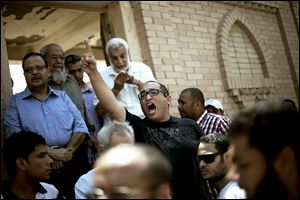
Egypt outlaws vigilantes; dozens of detainees die
Military struggles to curtail violence, protests
8/19/2013
A friend of Ammar Badie shouts, ‘Allah is the greatest,' while attending Mr. Badie’s burial Sunday. Mr. Badie, 38, the son of the Muslim Brotherhood’s spiritual leader, was killed Friday by security forces in Cairo.
CAIRO — Egypt’s military-backed government on Sunday banned vigilante groups and issued a fresh warning that it would not tolerate violence from civilians as it struggled to keep a crisis over the country’s deposed Islamist leader from spinning further out of control.
Civilian “people’s committees” armed with clubs, sticks, and guns have showed up on Egyptian streets in recent days in an ominous turn to the bloody saga that has unfolded since President Mohammed Morsi was ousted on July 3.
More than 800 civilians and 70 members of the security forces have been killed in violence since a crackdown on Morsi supporters began Wednesday.
The state-run Middle East News Agency reported that 79 of the deaths occurred Saturday.
Even as authorities seemed to be trying to tamp down the violence, though, an alliance representing Mr. Morsi’s supporters said Sunday that 52 detainees rounded up during the recent demonstrations were killed by police while they were being transferred to a prison north of Cairo.
The government put the number of deaths in the incident at 36.
In a sign of the simmering tensions between the government and the country’s largest Islamist group, the Muslim Brotherhood, thousands of demonstrators calling for Mr. Morsi’s reinstatement took to the streets Sunday for the third day in a row.
Security forces, however, closed roads and deployed tanks to choke off protests in Cairo, blunting the usually impressive ability of the Brotherhood to turn out its supporters.
Egypt’s defense minister, Gen. Abdel-Fattah el-Sissi, in a televised speech Sunday to an audience of uniformed military and security officials, vowed to deal forcefully with perpetrators of violence.
General el-Sissi, who led the ouster of Mr. Morsi, said that supporters of the ousted regime would be welcome to participate in politics in the future.
But it was unclear whether that offer extended to members of the Brotherhood, which is allied with Mr. Morsi.
The interim government installed by General el-Sissi has hinted that it is considering instituting a ban on the Muslim Brotherhood.
“We will not be silent in the face of the destruction of the country and the people, of the burning of the homeland and terrorizing innocent people,” the general said.
Morsi supporters are welcome “to participate in rebuilding of the democratic path and to engage in the political process, according to the map of the future rather than confrontation and destruction of the Egyptian state,” he said.
But an alliance of Morsi supporters said Sunday that General el-Sissi’s conciliatory comments on political inclusion were belied by the slaying of detainees, which “confirms the systematic violence practiced against opponents of the coup.”
Egypt’s Interior Ministry said 36 prisoners died in the incident, in which it said 612 members of the Brotherhood had tried to escape, in the process taking a police officer hostage.
The prisoners died of suffocation when tear gas was fired or during a stampede by some trying to get away, the ministry reported.
Security forces rescued the police officer, the ministry said.
The military broke up two Brotherhood protest camps in Cairo last week, killing hundreds of demonstrators who had occupied the sites to demand Mr. Morsi’s reinstatement.
The interim government has imposed a dusk-to-dawn curfew and declared a state of emergency to try to restore order and curtail protests over Mr. Morsi’s removal.
Signaling fears that violence could escalate, though, the Interior Ministry on Sunday outlawed “people’s committees,” saying they had been “exploited by others in conducting acts against the law.”
The pro-army vigilante groups have participated in efforts to quell the protests, in a sign of the widespread sense of fury at Mr. Morsi.
Some participants in pro-Morsi rallies, however, also brandished weapons, despite a call from the Brotherhood to keep the protests peaceful.
In Washington, U.S. lawmakers condemned the recent government crackdown but remained conflicted about whether to cut military aid.
“I would cut off aid but engage in intense diplomacy in Egypt and in the region to try to say, ‘Look, we will restore aid when you stop the bloodshed in the street and set up a path toward democracy that you were on before,’ ” said Rep. Keith Ellison (D., Minn.).
“In my mind, there’s no way to say that this was not a coup,” Mr. Ellison said on ABC’s This Week. “It is. We should say so. And then we should follow our own law, which says we can’t sit — we cannot fund the coup leaders.”
Rep. Peter King (R., N.Y.) warned, however, that reducing aid would curtail U.S influence.
“We certainly shouldn’t cut off all aid,” he said on Fox News Sunday.
“The fact is there’s no good guys there,” he said. “But of the two, I think there is more opportunity to protect American interests if we work with the military and continue our relationship with the military.”
Sen. Bob Corker of Tennessee, the ranking Republican on the Senate Foreign Relations Committee, said on This Week that the United States needed to “recalibrate” its aid to make its displeasure clear but not endanger security needs such as priority passage through the Suez Canal.